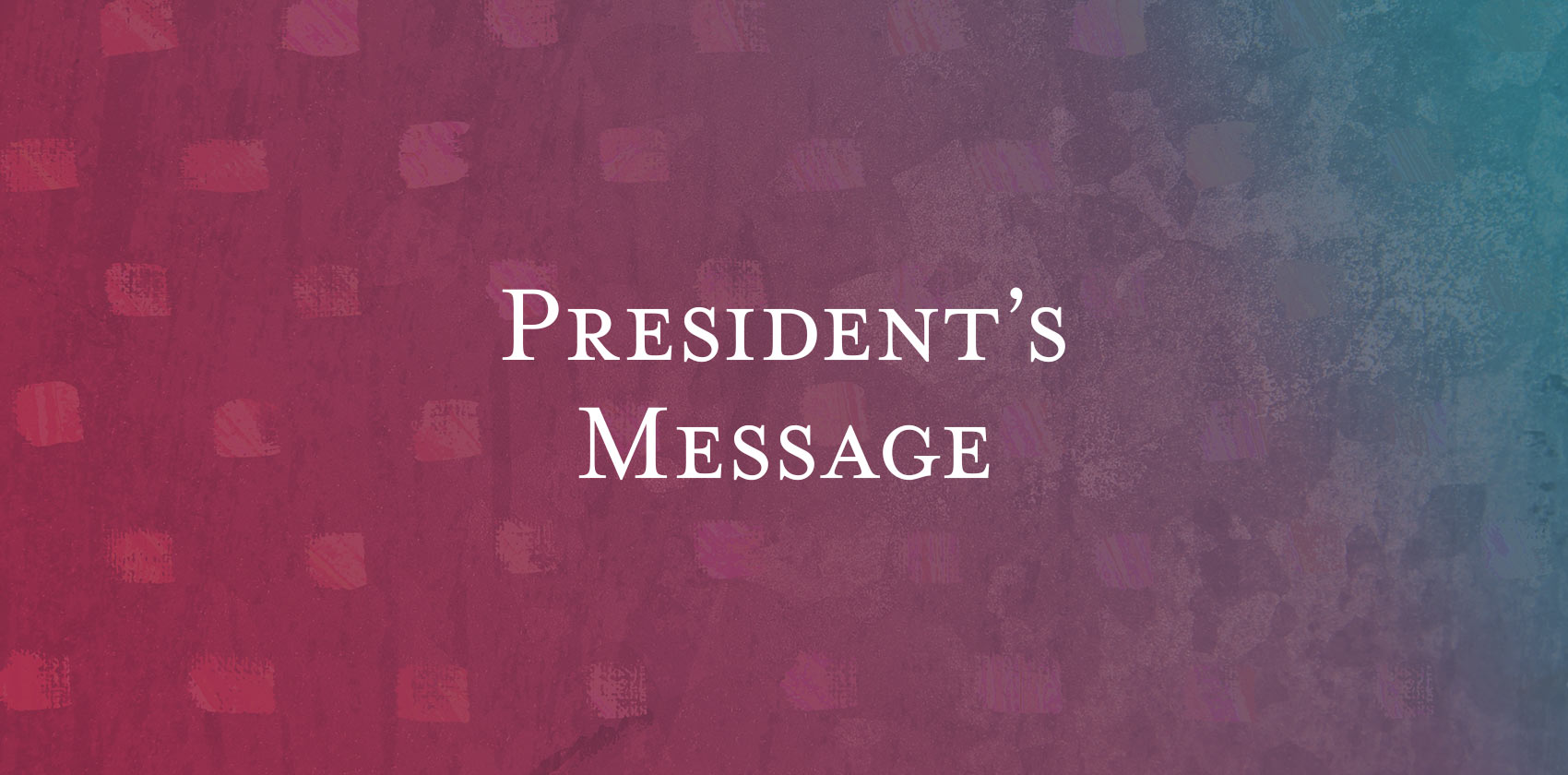
President’s Message
Better Safe Than Sorry
Better safe than sorry. This likely sums up the present planned phased exit of the Circuit Breaker (CB) phase. It is not the jumpstart that a number were looking for. Many lawyers are eager to return to the ante status quo, to business as (close to) usual and to some semblance of a world in which we have comfort levels, security and stability. But pragmatic public health considerations prevail to eliminate the contagion. The last thing any of us want to witness is a return to a second Circuit Breaker or become the next cluster reported in the news as a new hotbed of local community transmission.
Questions abound as we transition. And in this message for this special COVID-19 issue, due to the unprecedented situation we are in, I propose to cover Questions, Questions, Questions and proffer some Answers (many of which are derived from the Ministry of Law (MinLaw) website on its FAQs).
I am doing this to go the extra mile to message as much as possible on the dos and don’ts in this period. These are my own responses to 20 questions in this upcoming period both as a matter of understanding the spirit behind the measures, a purposive understanding of the regulations and common sense. A number of these have been asked already or are being asked. Please note that my remit in this exercise is to confine myself to the post-CB phase. The separate and earlier Law Society advisories to the extent relevant (and not superseded) should continue to be noted and followed.
- Can law practices resume regular business activities from 2 June?
Yes. Legal services are included in the list of businesses that may operate from 2 June 2020. (see Question 21 of the MinLaw FAQs)
- Are legal services only restricted to the four categories of legal activities identified as essential services in the MinLaw’s advisory of 5 April 2020?
No. It extends beyond the four essential legal services outlined during the CB period. (see Question 25 of the MinLaw FAQs)
- Must law practices apply for an exemption to operate from 2 June onwards?
No. As such, the CB regime of General Exemptions and Time-Limited Exemptions no longer apply. Ministry of Trade and Industry (MTI) has granted law practices a class exemption to resume business subject to the law practice implementing Safe Management Measures before resuming workplace activities. (see Questions 22 and 24 of the MinLaw FAQs)
- What Safe Management Measures need to be adopted?
See the guidelines on implementation of Safe Management Measures on “Requirements for Safe Management Measures at the workplace” (Safe Management Measures Requirements). To ensure COVID-safe workplaces, employers should take care of :
-
- Your workers
- Your workplaces
- Those who may become unwell at your workplaces
In addition, employers must establish a system to implement Safe Management Measures to provide a safe working environment and minimise risks of COVID-19 outbreaks. These measures must be implemented in a sustainable manner for as long as necessary :
-
- Implement a detailed monitoring plan
- Appoint a Safe Management Officer
The measures must be in place, communicated and explained to employees prior to resuming work. Signs should also be put up to remind employees and visitors to observe all measures in place.
- Following on from Question 4(a) above, how does one take care of workers/employees?
-
- Actively enable employees to work from home (WFH);
- For job roles or functions where employers cannot WFH, employers must ensure that the following precautions are in place prior to resuming operations :
- Staggered work and break hours
- Implement split team arrangements
- Minimise socialising
- Wear masks at the workplace
- Observe good personal hygiene
(see Paragraphs 5 to 9 of Safe Management Measures Requirements and details there)
- Following on from Question 4(b) above, how does one take care of workplaces?
-
- Control access at the workplace
- Employees and visitors must file a health declaration via SafeEntry or other means (e.g. electronic or hard copy records) before being allowed access to enter the premises
- Adhere to travel advisories
- Ensure clear physical spacing of at least 1 metre between persons at all times
- Minimise need for physical touchpoints
- Step up cleaning of workplace premises
- Provide cleaning and disinfecting agents
(see Paragraphs 10 to 16 of Safe Management Measures Requirements and details there)
- Following on from Question 4(c) above, how does one take care of workers who become unwell at their workplaces?
-
- Ensure regular temperature checks for temperature and respiratory symptoms for all onsite employees and visitors
- Record proximity data on phones
- Actively monitor unwell employees and guard against incipient outbreaks
- Manage unwell cases
- Manage confirmed cases
(see Paragraphs 17 to 22 of Safe Management Measures Requirements and details there)
- What are the consequences of not complying with Safe Management Measures?
Strict checks will be conducted. Law practices that do not provide a safe workplace for their employees will have their operations suspended until they are able to do so.
(see Question 24 of the MinLaw FAQs)
- Must law practices submit manpower details and if so, when?
Yes, you need to do so. You should do so within two weeks of the date of resumption of operations.
(see Question 22 of the MinLaw FAQs)
- How do law practices submit manpower details?
Using the “Permissions and Manpower Declaration” button on the GoBusiness portal (http://covid.gobusiness.gov.sg/) from 26 May onwards.
(see Question 22 of the MinLaw FAQs)
- What is the guiding principle in this Phase 1 period for law firms to strike an appropriate balance between working from office and telecommuting/remote working/WFH?
Law practices are to adopt telecommuting/WFH to the maximum extent as far as reasonably practicable (“the Guiding Principle”) (see Questions 22 and 26 of the MinLaw FAQs). The rationale for this is to reduce physical interaction so as to minimise the spread of COVID-19.
(see Question 26 of the MinLaw FAQs)
- When can employees come into the office?
Considering the Guiding Principle, employees should only come into the office when demonstrably needed. The illustration (non-exhaustive) given in the MinLaw FAQ is that of accessing specialised systems. The burden will be on the law firm to demonstrate that the employee cannot WFH and needs to work from the office instead. It will be important to adhere to the spirit of the Guiding Principle as much as possible in these early days of emerging out of the CB Period.
(see Question 22 of the MinLaw FAQs)
- Is there a quota on the number of employees who can work from office? The other side of the coin on this question is whether there is a minimum percentage or number of employees that law practices must be placed on WFH with resumption of business activities from 2 June?
On the first question, no, based on our interpretation of MTI’s current guidelines. On the second question, there is no specified minimum percentage or number stated by MinLaw (see Question 26 of the MinLaw FAQs). However, do note the Guiding Principle. The proportion of employees that are able to telecommute (full- and part-time staff) will vary in different workplaces due to differing operational requirements.
(see Question 26 of the MinLaw FAQs)
- What are the obligations on employers insofar as WFH is concerned?
There is an onus on employers to show that they have made reasonable efforts to facilitate working from home (see Question 26 of the Min Law FAQs). Logically, this means providing employees with technological support to do so.
- Must employees and visitors wear a mask at all times at the workplace?
No. In most part, for general office workplaces, both employees and visitors must wear a mask at all times at the workplace except during activities requiring removal of the masks (such as when eating or drinking). This is over and above the Safe Management Measures.
(see Question 4 above)
- Must lawyers wear a mask for court hearings via video or teleconferencing?
Yes, save to the extent that it is necessary to speak. It goes without saying that the other Safe Management Measures must be in place at the workplace.
(see Question 27 of the MinLaw FAQs).
- Is service of court processes permissible?
Yes, including delivery by hand where necessary. Process servers should observe safe distancing and take all necessary other precautions required under the Control Order [i.e. the COVID-19 (Temporary Measures)(Control Order) Regulations 2020] at all times.
(see Question 28 of the MinLaw FAQs).
- Can clients be physically present at the offices of law practices for the purpose of meetings, notarisation, signing of wills, contracts, mortgages, instruments of conveyancing and other legal documents?
Yes, where physical presence is necessary (such as to complete a contract or transaction legally required to be completed in person). It goes without saying that employees of the law practice and clients are required to observe the Safe Management Measures requirements at all times.
(see Question 29 of the Min Law FAQs)
- What are the protocols for safe distancing for physical court hearings?
For the preparation, presentation and conduct of court hearings after 1 June 2020, parties are to strictly comply with all safe distancing and other applicable measures required by Singapore law or prescribed by the Court to minimise the local transmission of COVID-19. These include requirements, such as wearing masks in the court premises, published on the Supreme Court website at https://www.supremecourt.gov.sg and State Court website at https://www.statecourts.gov.sg/cws/covid-19/pages/COVID-19.aspx and the respective courtroom notices. For the Family Justice Courts (FJC), all parties are to ensure that the preparation, presentation and conduct of their cases do not breach safe distancing measures in place at the relevant time. Masks are to be worn at all times in the FJC premises, including during the conduct of court hearings, unless the Court directs removal.
(see Supreme Court Registrar’s Circular No. 6 of 2020, State Courts Registrar’s Circular No. 10 of 2020 and Family Justice Courts Registrar’s Circular No. 4 of 2020)
- Are the Bar Rooms open?
For the Supreme Court Bar Room, not for now. The Supreme Court has, however, thoughtfully designated an area in level B1 for the use by practitioners or court users who require space to work, rest or have their lunch. All practitioners and court users must continue to practise safe distancing within the court premises and vicinity at all times.
For the State Courts Bar Room, yes. Law Soc will resume Bar Room operations on a limited basis during Phase I of the post-circuit-breaker period. For the initial period from 2 to 5 June 2020, the Bar Room will be open only during State Courts’ lunch break hours, from 12:00 pm to 2:00 pm. Law Soc will closely monitor the situation and advise members on the Bar Room opening hours thereafter based on usage by members balanced with safe distancing requirements.
(see Law Society’s e-distribution mailer on 1 June 2020 including for the safe distancing measures and additional safety precautions for the State Courts Bar Room).
Tags:
Editor's Pick
Gregory Vijayendran, SC
Partner, Dispute Resolution
Rajah & Tann Singapore LLP
Immediate Past President
The Law Society of Singapore
Partner, Dispute Resolution
Rajah & Tann Singapore LLP
Immediate Past President
The Law Society of Singapore






